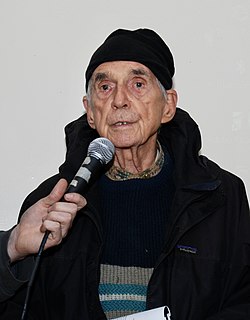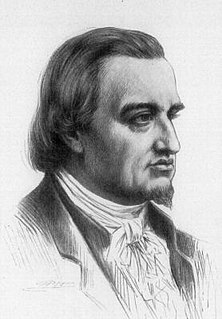A Quote by Daniel Berrigan
Every nation-state tends towards the imperial - that is the point. Through banks, armies, secret police, propaganda, courts and jails, treaties, taxes, laws and orders, myths of civil obedience, assumptions of civic virtue at the top. Still it should be said of the political left, we expect something better. And correctly. We put more trust in those who show a measure of compassion, who denounce the hideous social arrangements that make war inevitable and human desire omnipresent; which fosters corporate selfishness, panders to appetites and disorder, waste the earth.
Quote Topics
Armies
Arrangements
Assumptions
Banks
Better
Civic
Civic Virtue
Civil
Compassion
Corporate
Correctly
Courts
Denounce
Desire
Disorder
Earth
Every
Every Nation
Expect
Hideous
Human
Imperial
Inevitable
Laws
Left
Make
Measure
More
Myths
Nation
Obedience
Omnipresent
Orders
Point
Police
Political
Propaganda
Put
Said
Secret
Secret Police
Selfishness
Should
Show
Social
Something
Something Better
State
Still
Taxes
Tends
Those
Through
Top
Towards
Treaties
Trust
Virtue
War
Waste
Which
Related Quotes
War is not the only form of violence imposed on people through inadequate social arrangements. There is also hunger, poverty and scarcity. The use of money and the creation of debt fosters economic insecurity, which perpetuates crime, lawlessness and resentment. Paper proclamations and treaties do not alter the facts of scarcity and insecurity, and nationalism tends only to propagate the separation of nations and the world's people.
The State exists simply to promote and to protect the ordinary happiness of human beings in this life. A husband and wife chatting over a fire, a couple of friends having a game of darts in a pub, a man reading a book in his own room or digging in his own garden-that is what the State is there for. And unless they are helping to increase and prolong and protect such moments, all the laws, parliaments, armies, courts, police, economics, etc., are simply a waste of time.
All the worth which the human being possesses all spiritual reality, he possesses only through the State... For Truth is the Unity of the universal and subjective Will; and the Universal is to be found in the State, in its laws, its universal and rational arrangements. The State is the Divine Idea as it exists on Earth. We have in it, therefore, the object of History in a more definite shape than before; that in which Freedom obtains objectivity...
Of all the enemies to public liberty war is, perhaps, the most to be dreaded, because it comprises and develops the germ of every other. War is the parent of armies; from these proceed debts and taxes; and armies, debts, and taxes are the known instruments for bringing the many under the domination of the few... No nation could preserve its freedom in the midst of continual warfare.
[T]here are, at bottom, basically two ways to order social affairs, Coercively, through the mechanisms of the state - what we can call political society. And voluntarily, through the private interaction of individuals and associations - what we can call civil society. ... In a civil society, you make the decision. In a political society, someone else does. ... Civil society is based on reason, eloquence, and persuasion, which is to say voluntarism. Political society, on the other hand, is based on force.
The eyes of mankind will be upon you to see whether the Government, which is now more popular than it has been for many years past, will be productive of more virtue moral and political. We may look up to Armies for our Defense, but Virtue is our best Security. It is not possible that any State should long remain free, where Virtue is not supremely honored.
The laws of Nature, that is to say the laws of God, plainly made every human being a law unto himself, we must steadfastly refuse to obey those laws, and we must as steadfastly stand by the conventions which ignore them, since the statutes furnish us peace, fairly good government, and stability, and therefore are better for us than the laws of God, which would soon plunge us into confusion and disorder and anarchy if we should adopt them.
The supreme duty of the Nation is the conservation of human resources through an enlightened measure of social and industrial justice. We pledge ourselves to work unceasingly in State and Nation for ... the protection of home life against the hazards of sickness, irregular employment and old age through the adoption of a system of social insurance adapted to American use.
The Constitution guarantees protection to property, and we must make that promise good. But it does not give the right of suffrage to any corporation. It is necessary that laws should be passed to prohibit the use of corporate funds directly or indirectly for political purposes; it is still more necessary that such laws should be thoroughly enforced.
Meyer [sic] Amschel Rothschild, who founded the great international banking house of Rothschild which, through its affiliation with the European Central Banks, still dominates the financial policies of practically every country in the world, said: ‘Permit me to issue and control the money of a nation, and I care not who makes its laws.’
The challenges that young people are mobilizing against oppressive societies all over the globe are being met with a state-sponsored violence that is about more than police brutality. This is especially clear in the United States, given its transformation from a social state to a warfare state, from a state that once embraced a semblance of the social contract to one that no longer has a language for justice, community and solidarity - a state in which the bonds of fear and commodification have replaced the bonds of civic responsibility and democratic vision.




































